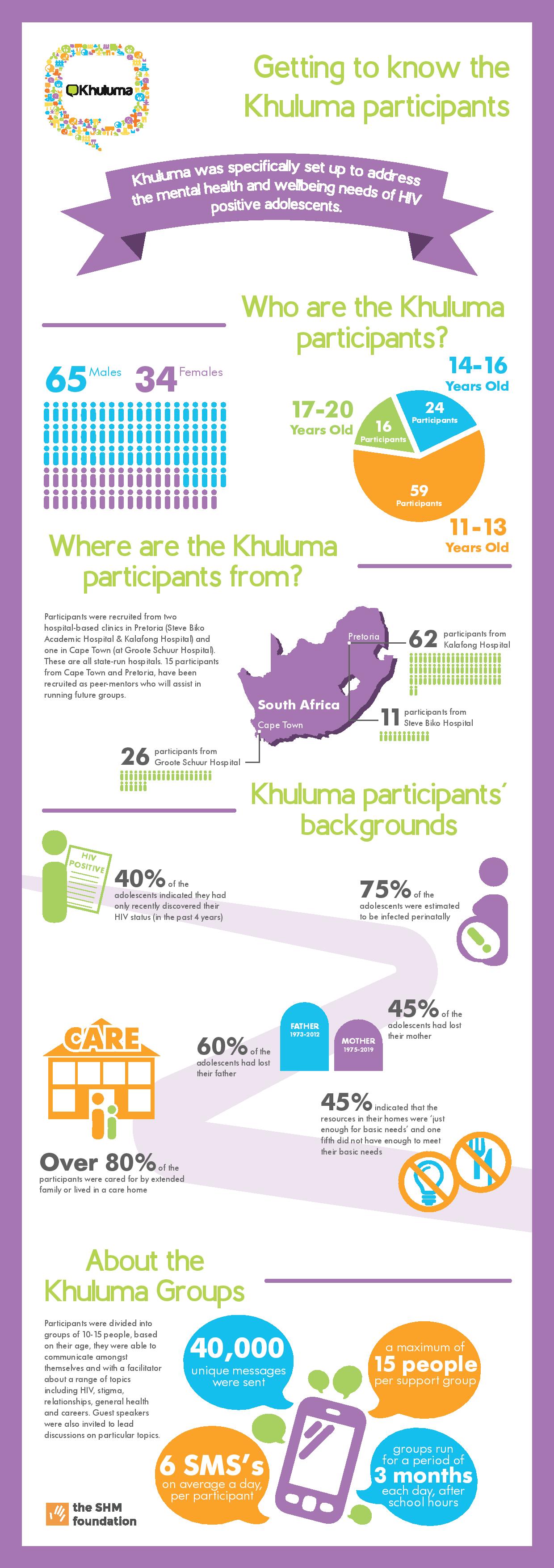There is growing awareness that HIV/AIDS affected and infected adolescents may be at increased risk of mental health problems and distress. Depression and anxiety are associated with treatment non-compliance, which can have a significant impact on health status. Moreover, HIV positive adolescents’ support structures can be weakened by challenging home environments and stigma in the community. The goal of Khuluma is to provide psychosocial support for HIV positive adolescents in South Africa using mobile technology.
The Khuluma model is an integrated, cost-effective and scalable mHealth platform that leverages the power of small groups to facilitate interactive, closed support groups of 10 to 15 participants. The project is currently working with 99 HIV positive adolescents. Participants communicate among themselves, with a facilitator and with a mentor (a HIV positive adolescent who has been through Khuluma) via mobile phone and can discuss any topic that they judge to be important.
The Khuluma model is a social approach to mental illness that brings together two concepts – the power of small support groups, and the power of mHealth – in an integrated platform which breaks down barriers to create a support group that is accessible, anonymous, immediate and age appropriate. It provides a platform for participants to correct misconceptions about their illness and receive accurate information. It also provides a space where participants feel free to discuss medical adherence and disclose details of their condition.
Project Details
- There is a maximum of 15 people per support group;
- The support groups run for a period of three months, each day, after school hours;
- The facilitator brings up a ‘topic of the day’ to generate a conversation within the groups;
- Guest speakers are also invited to run facilitated discussions on specific topics such as nutrition, education, careers advice or sexual health;
- 40 000 unique messages were sent, with an average of six SMS messages per day per participant
Impact summary
- 99 HIV positive adolescents have sent over 40 000 SMS messages over three months;
- The program increased perceived feelings of social support and decreased internalized social stigma;
- Only £82/$125 USD was spent per participant per session.
"I learned that I should not be afraid to talk about my feelings. Before I started in the Khuluma group I felt like I was different to other people."
- Khuluma participant
An extract from an SMS conversation:
Facilitator: If you are HIV positive and you have sex with someone who is also positive do you still need to use protection - like a condom?
Participant one: I dnt knw.
Participant two: No he is negative
Facilitator: Even if both partners are HIV positive they can still be infected with slightly different strains of the virus. So always use a condom.
Participant two: That is new.
Khuluma was set up to break down the following barriers to young people attending support groups:
Stigma and discrimination
Despite nation-wide campaigns in South Africa, many fear disclosing their chronic illness or HIV status and experience stigma and discrimination in the communities that they live in.
Access (finding the time to attend a support group)
HIV-positive adolescents can have complex lives, with regular visits to clinics and hospitals to pick up their medication and check-ups, along with attending school and fulfilling responsibilities at home.
Social Isolation (finding support groups tailored to adolescents)
If they are lucky enough to have access to support groups at their clinic or hospital, the groups tend to cover a wide age range, making it challenging to bring up age-appropriate topics.
Funds (having the necessary funds such as transport costs available to attend)


Please Sign in (or Register) to view further.